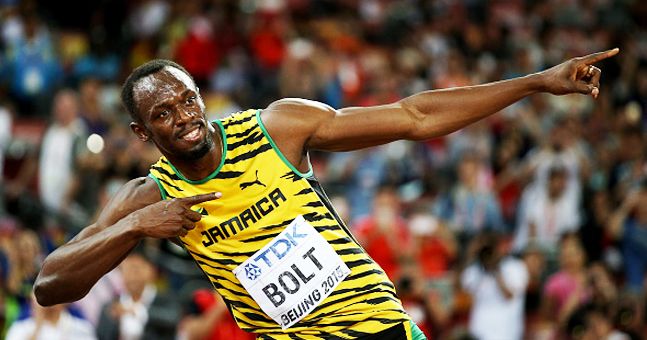

Share
16th August 2016
07:18pm BST

 Fulham FC nutritionist and Essential Nutrition founder Caroline Farrell told the Telegraph that his astonishing competition diet might not have been as bad as it sounds.
‘As an athlete, you need a lot of protein, and chicken is a great source, granted. That said, anything deep fried is - unsurprisingly - not the ideal way to meet your body’s protein requirements. 100 nuggets a day come with much more unhealthy fats, and less protein, than lean chicken.’
The reason that eating mountains of junk food isn't going to be ideal for most athletes (except Bolt, seemingly, who is a freak of nature) comes down to body composition and ultimately, performance.
Sprinters' bodies have to be absolutely primed to perform their best in the 100m. As we saw in the final in Rio, there was just 0.25 seconds between first and last place - so the margins are so tight at the top.
So it's so important for sprint athletes to maintain a body composition with the most power-producing fast twitch muscle fibres and least amount of excess body fat to enable them to be as fast as possible.
Eating any more than your body needs will just add body mass and can hamper speed - and that's why eating calorie-dense, nutrient-light fast food can easily stack up.
Even the amount of food in your stomach on race day can impact performance and our interview with former 100m hurdler Sarah Claxton she would always eat small meals that didn't slow her down.
Now 29 years old (and still wiping the floor with everyone) Bolt has cleaned up his act in terms of nutrition.
Fulham FC nutritionist and Essential Nutrition founder Caroline Farrell told the Telegraph that his astonishing competition diet might not have been as bad as it sounds.
‘As an athlete, you need a lot of protein, and chicken is a great source, granted. That said, anything deep fried is - unsurprisingly - not the ideal way to meet your body’s protein requirements. 100 nuggets a day come with much more unhealthy fats, and less protein, than lean chicken.’
The reason that eating mountains of junk food isn't going to be ideal for most athletes (except Bolt, seemingly, who is a freak of nature) comes down to body composition and ultimately, performance.
Sprinters' bodies have to be absolutely primed to perform their best in the 100m. As we saw in the final in Rio, there was just 0.25 seconds between first and last place - so the margins are so tight at the top.
So it's so important for sprint athletes to maintain a body composition with the most power-producing fast twitch muscle fibres and least amount of excess body fat to enable them to be as fast as possible.
Eating any more than your body needs will just add body mass and can hamper speed - and that's why eating calorie-dense, nutrient-light fast food can easily stack up.
Even the amount of food in your stomach on race day can impact performance and our interview with former 100m hurdler Sarah Claxton she would always eat small meals that didn't slow her down.
Now 29 years old (and still wiping the floor with everyone) Bolt has cleaned up his act in terms of nutrition.
 He tries to resist the temptation to eat fast food and instead eats broccoli (which he hates), lean meat and yams, which are a brilliant complex carbohydrate that former Olympic gold medallist and current IBF heavyweight champ Anthony Joshua swears by.
Farrell said that this new-found focus on whole, clean foods can only benefit his performance.
‘Athletes ought to target whole food which is nutrient-dense, rather than anything processed, which tends to be high in unhealthy fats, and lower in important nutrients, such as antioxidants.
'Both of these factors affect recovery, which is vital when you’re training at high volume and intensity. At this level, it’s extremely important to avoid fast food.’
‘The most important factor is eating the right foods at the right times, so that the athlete has all the necessary building blocks to fuel their exercise and aid recovery. This includes protein, carbohydrates, fats, and antioxidants - as well as hydration. Foods which support the sprinter’s immune system are also crucial: you can’t train if you’re ill.’
How Bolt claimed triple gold in 2008 eating five 20 boxes of nuggets a day, we'll never know. The man is clearly genetically gifted with his long limbs, athletic frame and powerful fast-twitch muscle fibres.
But clearly cleaning up his diet hasn't done the man's performance any harm.
He tries to resist the temptation to eat fast food and instead eats broccoli (which he hates), lean meat and yams, which are a brilliant complex carbohydrate that former Olympic gold medallist and current IBF heavyweight champ Anthony Joshua swears by.
Farrell said that this new-found focus on whole, clean foods can only benefit his performance.
‘Athletes ought to target whole food which is nutrient-dense, rather than anything processed, which tends to be high in unhealthy fats, and lower in important nutrients, such as antioxidants.
'Both of these factors affect recovery, which is vital when you’re training at high volume and intensity. At this level, it’s extremely important to avoid fast food.’
‘The most important factor is eating the right foods at the right times, so that the athlete has all the necessary building blocks to fuel their exercise and aid recovery. This includes protein, carbohydrates, fats, and antioxidants - as well as hydration. Foods which support the sprinter’s immune system are also crucial: you can’t train if you’re ill.’
How Bolt claimed triple gold in 2008 eating five 20 boxes of nuggets a day, we'll never know. The man is clearly genetically gifted with his long limbs, athletic frame and powerful fast-twitch muscle fibres.
But clearly cleaning up his diet hasn't done the man's performance any harm.
Explore more on these topics:

World of Sports - SportsJOE.ie | SportsJOE
world of sport